- About Ramapo
- Academics
- Admissions & Aid
- Student Life
- Athletics
- Alumni
- Arts & Community
- Quick Links
- Apply
- Visit
- Give
Center for Data, Mathematical, and Computational Sciences
October 24, 2023DMC Students meet with Mike Marusic, President and CEO of Sharp Imaging and Information Company of America
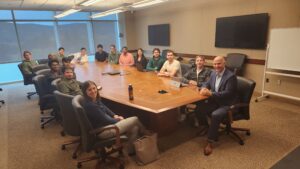
Thursday, October 19, 2023
Students from the Computer Science and Data Science clubs met with Mike Marusic, the CEO of Sharp, following his Presidential Speaker Series talk. This provided Ramapo students with the unique experience of engaging in a small group discussion with the chief executive of a major corporation. Mr. Marusic emphasized the importance of having a strong work ethic and investing time in building a professional network. “I learned that networking on LinkedIn is very important as a student,” said Computer Science Club president Daniel Rajakumar ’26. Students were given the opportunity to ask Mr. Marusic anything, such as what it’s like to work as a CEO, career advice, predictions of future trends in the job market, and more. Data Science Club faculty advisor Dr. Debbie Yuster adds, “Our students had great questions, and Mr. Marusic’s answers were very enlightening. One of the secrets to his success has been taking risks, such as moving between roles in completely new areas of the company. It was amazing for our students to have the opportunity to chat with and learn from such an important leader in business.”
Categories: Uncategorized
May 2, 2023Congratulations to the Data Science Club - New Club of the Year!

The Ramapo College SGA recognized the Data Science Club with its 2023 “New Club of the Year” award! The club had a great first year, discussing topics such as web scraping, natural language processing, agile software development, and more. They also held social activities, a scavenger hunt, and a “Bad Graph of the Week” series on data visualization.
Congratulations to the Data Science Club membership and a big thank you to the executive board: Founding President Thomas Ortega, Vice President Zainab Makhdum, Secretary Ankit Kafle, and Treasurer Merit Kayastha. Thanks also to the club’s faculty advisor, Prof. Debbie Yuster.
Interested in joining one of the DMC Student clubs? Take a look at the membership and get in touch with one of the club officers or the club’s faculty advisor today!
Categories: Uncategorized
March 2, 2023Ramapo College DMC - Community College Day
Tuesday, April 18, 2023, 3:00-7:00pm
505 Ramapo Valley Road, Mahwah NJ 07430
- Learn about transfer pathways to complete your BS degree at Ramapo College.
- Earn your MS degree in just one additional year as part of our 4+1 programs in Data Science, Applied Mathematics and Computer Science.
- Come for a campus tour, meet our faculty, and stay for our evening fair, featuring keynote speaker Dr. Luke DuBois (NYU), followed by a student research poster showcase.
Categories: Uncategorized
February 20, 2023Save the date! 2023 DMC Fair - April 18th
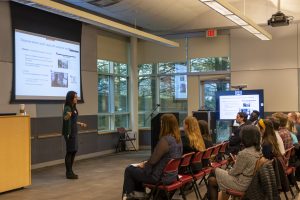
Joint event with the Music Program
Date/Time: Tuesday, 4/18/23, 5-7 pm
Location: Ramapo College, Trustees Pavilion
Join us for the Data, Mathematical, and Computational Sciences (DMC) Fair on April 18th, 2023. This year’s DMC Fair is a joint event with Ramapo’s Master of Fine Arts in Creative Music Technology program. This event will feature keynote speaker Dr. R. Luke DuBois, Associate Professor and Director of Research, Integrated Design & Media at New York University. Here is a link to Dr. DuBois’ TED talk, which weaves information from a multitude of sources into art and music exploring the tensions between algorithms, portraiture, and temporal space.
Description of Talk: For the last twenty-five years Dr. DuBois has been making music and art that comment on the intersection of 21st century culture and our obsession with the quantification of our world. These projects sit somewhere in between portraiture and composition, in that they leverage media, information, algorithms, and emotion to invoke the big picture narratives behind this century of data.
About the Speaker: R. Luke DuBois is a composer, artist, performer, designer, and software engineer who explores the
temporal, verbal, and visual structures of cultural and personal ephemera. He holds a doctorate in music
composition from Columbia University, and is the co-author of Jitter, a software suite for the real-time
manipulation of matrix data developed by San Francisco-based software company Cycling’74; he is a
regular contributor to other toolkits for creative coding, including p5.js and RTCmix. He is the research
director of the IDM program at NYU Tandon, and was a founding co-director of the NYU Ability Project.
Luke’s research interests range from inclusive design to cyber-physical systems to telepresent
collaboration. He works across many disciplines and has collaborated with NYU faculty in departments
ranging from Computer Science to Occupational Therapy, and teaches in a triple appointment between
IDM at NYU Tandon and the programs in Music Technology at NYU Steinhardt and ITP/IMA at NYU Tisch.
He is currently a co-investigator on multiple NSF-funded projects, including SONYC, a multi-year
investigation around noise pollution in New York City; and the NYU Holodeck, a research platform for
investigating what happens when VR, motion capture, and telecommunication infrastructure reach the
level of everyday use. Finally, Luke designs, builds, and restores analog and hybrid analog/digital
modular synthesizers in the audio lab, making open-source designs for creative signal processing.
Following the keynote speech, attendees can view posters showcasing Ramapo students’ research projects in Data, Mathematical, Computational Sciences, and Creative Music Technology. Attendees will be able to network with Ramapo students and faculty as well as industry professionals. Awards will be given for the best posters.
This event was supported by a grant from the Ramapo College Foundation.
Categories: Uncategorized
February 3, 2023Ramapo College and CCM Sign New Jersey’s First Data Science Transfer Agreement!
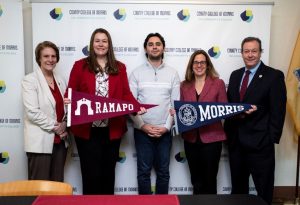
Ramapo College of New Jersey and County College of Morris (CCM) have partnered to create pathways for aspiring data scientists to earn a masters in data science in as little as five years. Through the 2+2+1 agreement, students can begin their education at CCM to earn their associate degree and then seamlessly transfer to Ramapo to earn their bachelors degree and then a masters in data science if they wish. Thomas Ortega, a graduate of Morris Hills High School and CCM, is in his fourth year in the 2+2+1 program and serves as the founder and President of the Ramapo College Data Science Club. Ramapo’s Master of Science in Data Science program is nationally ranked a Top 30 Masters program by Fortune Magazine, making it the #1 graduate data science program in New Jersey. By taking a number of graduate courses as an undergraduate at Ramapo, the masters can be completed in one year, allowing students to enjoy significant savings on their higher education. CCM now has more than 170 transfer agreements to ease the process of earning an associate and then a bachelors degree.
Read more here!
Categories: Uncategorized
September 12, 2022Welcome new MS and 4+1 in Data, Mathematical, and Computational Sciences students!
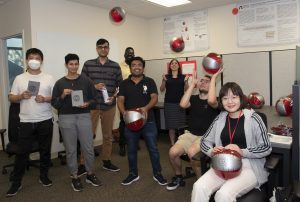
We are excited to welcome students into our new MS in Applied Mathematics and MS in Computer Science programs at Ramapo College! They join our MS in Data Science students as members of our DMC community. All of these new programs are taught by our dedicated full-time faculty. We had a chance to meet them on Thursday, September 8th at the DMC Meet-and-Greet. We are so happy you chose to continue your education with us!
Categories: Uncategorized
April 4, 2022Fall 2022 DMC Course Schedule
1st Year Students
Welcome to Ramapo College of New Jersey! Whether you are entering the MS in Data Science, Applied Mathematics, or Computer Science, there are a few things you will want to take care of to get ready for your first semester. Admissions has a guide for admitted students, which outlines the registration process and a number of other things of interest.
Fall 2022 Course Schedule
-
CMPS 547 – Foundations of Computer Science
This course provides a foundational overview of programming language design, including compiled languages as well as higher level scripting languages. The course introduces students to concepts such as grammars, binding, scope, flow control, and data abstraction – through the lense of multiple languages. Students will also gain experience programming across language interfaces. This course serves 3 core purposes as a foundational course for MSCS students: (1) Principles of Programming Languages – this course serves as a general introduction to the theory of computation and programming language design. Topics cover basic theory of computation, and language principles such as context free grammars; binding and scope; static and dynamic semantics; type safety; recursion; concurrency. The theoretical topics covered throughout the course will be demonstrated / mapped to the programming topics languages introduced. (2) The C programming language – students are introduced to the C as a way to prepare them for courses such as Operating Systems and so they understand aspects of low level programming language to support the Computer Architecture course as well. The fundamental topics in C include types, control flow, structures, arrays, pointers, and relationship to hardware via compilation. (3) Python Programming – students will learn how higher level languages differ from C, and how they map to lower level languages. Significant time will be spent covering a variety of language concepts through the lens of Python, culminating with extending Python via C through Cython.
Monday nights – 6:05pm – 7:20pm
Required for MS Computer Science first year students.
Category 2 elective for MS Applied Mathematics students -
MATH 680 – Advanced Mathematical Modeling
This course requires students to develop, use, and assess models to solve real-world problems using the mathematical modeling process. Models developed in a variety of disciplines, including linear programming, network science, decision theory, machine learning, are studied and used to solve problems in other disciplines.
Monday nights – 6:05pm – 7:20pm
Required for MS Data Science second year students.
Required course for MS Applied Mathematics students (any year, with pre-requisites).
Category 2 elective for MS Computer Science students (with pre-requisites).DATA 601 – Introduction to Data Science
This course serves as the foundation for all DATA graduate level coursework. It will cover programming, data analysis, data visualization, ethics and security / privacy concerns surrounding data, and other topics students are expected to master in the program. The course will also feature a Seminar component designed to acclimate students to working with Industry Sponsors and to hear first hand from people working in Data Science.
Tuesday nights – 6:05pm – 7:20pm
Required for MS Data Science first year students.
Category 2 elective for MS Applied Mathematics (recommended for first year students).MATH 570 – Applied Statistics
This course gives an introduction to statistical methods used in data science with an emphasis on applications. Topics may include foundations of probability, univariate and multivariate random variables and distributions, special distributions, Central Limit Theorem, one- and two-sample methods, point estimation, interval estimation, hypothesis testing, regression analysis, Bayesian analysis, data analysis and model building.
Tuesday nights – 8pm – 9:15pm
Required for MS Data Science full time first year students. May be deferred to future semester for part time MSDS students.
Required for MS Applied Mathematics students full time first year students. May be deferred to future semester for part time MSAM students.
Category 2 elective for MS Computer Science students (recommended for first year students).CMPS 530 – Python for Data Science
This course introduces students to fundamental programming concepts and skills utilized by Data Scientists – in particular parallel computing, I/O, and visualization – all through the Python programming language and associated libraries (i.e. numpy, pandas, etc.). The course is suitable for students with a basic knowledge of programming, and prepares students to take more advanced computing courses in databases, big data analytics, machine learning, and other DATA and CMPS electives.
Required for MS Data Science full time first year students. May be deferred to future semester for part time MSDS students.
Category 2 elective for MS Applied Mathematics students (strongly recommended for first year students).
Category 1 elective for MS Computer Science students (recommended for first year students).MATH 562 – Applied Linear Algebra
This course is a foundational course for the study of Linear Algebraic structures used in a variety of scientific and computational applications, such as data fitting, clustering, feature engineering, image processing, machine learning, optimization, and dynamical systems. In order to achieve this purpose, this course will cover topics in linear algebra including vector and matrix operations, linear transformations, linear independence, norms, decomposition, and least squares.
Thursday nights – 8pm – 9:15pm
Category 1 elective for MS Data Science students.
Required for MS Applied Mathematics (strongly recommended for first year students).
Category 2 elective for MS Computer Science students (recommended for first year students).Categories: Uncategorized
March 24, 2022DMC Advisory Board Member - Dobri Yordanov

Ramapo College’s Center for Data, Mathematical, and Computational Sciences welcomes Dobri Yordanov to our Advisory Board! Our Advisory Board’s mission is to assist the Center in aligning our curriculum with industry needs and expectations, helping us to promote our curriculum, and guide us in developing our sponsored fieldwork experiences to our students.
Dobri is a Ramapo ’15 graduate with a BS in Computer Science and Mathematics. He started his career with web and flash freelancing even prior to attending and was a part of developing the infrastructure behind most of the ramapo.edu websites. After graduation, he spent 4 years at Google, working on critical infrastructure on Google Maps, Google Assistant and Daydream (virtual / augmented reality). Facebook was the next prototyping home for him, where he led engineering on a music collaboration experience called Collab as a part of NPE, Facebook’s experiences incubator. Most recently, he’s joined Manticore Games as a principal engineer, leading major efforts to build out the next big thing in game development. Dobri is also an adjunct faculty in computer science at Ramapo, most recently running a course on computer graphics in Unreal Engine 5.
Categories: Uncategorized
March 1, 2022Center for Data, Mathematical, and Computational Sciences Fair
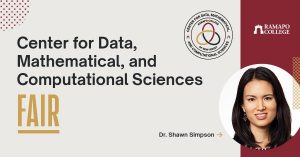
Date/Time: Tuesday, 4/5/22, 5-7pm
Location: Ramapo College, Trustees Pavilion 1Join us for the Data, Mathematical, and Computational Sciences Fair on April 5th, 2022! This event will feature keynote speaker Dr. Shawn Simpson, Principal Data Scientist at BlackRock AI Labs, who will share practical tips gleaned from her career as a Data Scientist in finance, media, and advertising. Following the keynote speech, attendees will have the chance to view posters showcasing Ramapo students’ research projects in Data, Mathematical, and Computational Sciences. Attendees will be able to network with Ramapo students and faculty, as well as prospective employers who may be looking to hire interns or full-time employees. Awards will be given for the best posters.
This event is open to current and prospective students, faculty, staff, and members of the public.
This page will be updated as more information about the event is announced
Schedule
- 5:00-5:05pm Guests arrive
- 5:05pm-5:10pm Welcome remarks (President Cindy Jebb)
- 5:10-5:20pm Welcome and overview of Ramapo’s bachelor and master degree programs in Data, Mathematical, and Computational Sciences (Scott Frees and Amanda Beecher)
- 5:20-6:15pm Keynote speech: “Field notes for future data scientists: tips from a career in industry” by
Dr. Shawn Simpson, Principal Data Scientist, BlackRock AI Labs. See additional information below. - 6:15-7:00pm Student poster session and networking event
Keynote Speaker
Speaker: Dr. Shawn Simpson, Principal Data Scientist, BlackRock AI Labs
Title: Field notes for future data scientists: tips from a career in industry
Abstract: When training to be a data scientist there is an emphasis on data analysis and modeling
techniques — but what happens once you are out in industry? This talk will provide practical suggestions based on my career in data science, with examples drawn from applications in news and media, finance, and advertising technology. Topics will include going deep with data, understanding uncertainty, joining forces with engineers, taking a product mindset, knowing your end user, and architecting end-to-end systems.Speaker bio: Shawn Simpson, Ph.D. is Principal Data Scientist in BlackRock AI Labs, where she leads an initiative that builds AI-powered decision tools for traders. Previously she was Senior Data Scientist at Tapad, a cross-device advertising technology firm. She built large-scale predictive models for telco applications using Scala, Spark/PySpark, Python, Hadoop MapReduce, and Google Cloud Platform technologies, and acted as lead data scientist on cross-functional product teams. Prior to that Shawn was Head of Data Science at Dow Jones. She was responsible for multivariate paywall testing on WSJ.com, predictive models for subscriptions and cancellations, company-wide data science training,
and internal consulting for newsroom, finance, and customer teams.Before joining industry Shawn was an Assistant Professor of Statistics at Columbia University. Her research focused on analysis of recurrent events, Bayesian methods for large-scale data, and post-
marketing drug safety surveillance. She has a Ph.D. in Statistics from Columbia University and a B.S. in Electrical Engineering from the University of Illinois at Urbana-Champaign.Categories: Uncategorized
February 7, 2022How to fail your tech interview successfully
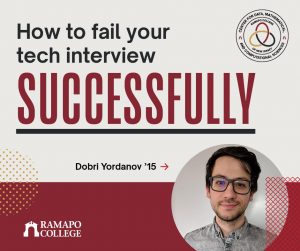
Feb 22nd at 6-7pm in ASB 332
Computer Science is hard. Being a Software Engineer is hard. Translating your computer science skills into a successful Software Engineer gig after college shouldn’t be hard. After interviewing close to 100 candidates at all levels for Google, Facebook and Manticore, Dobri Yordanov has a few tips and tricks to share, as well as pitfalls to avoid. Join us if you’d like to hear about them, be it out of curiosity or practicality. Everyone is welcome!
Biography: Dobri is a Ramapo College ’15 graduate, originally from Bulgaria. Since graduating, he’s built a career as a Software Engineer and a self-described Prototype Wizard in large tech working for Google and Facebook, and most recently landing in the game industry as a principal engineer at Manticore Games. As of ’21, you can occasionally catch him in Ramapo teaching some of our Computer Science classes. He likes long walks on the beach in VR and philosophical ponderings about the nature of our existence and ethics in technology. He will also absolutely listen to you about your favorite algorithm or design paradigm – he is 100% that kind of dork.
Categories: Lecture Series, Uncategorized
Copyright ©2025 Ramapo College Of New Jersey. Statements And Policies. Contact Webmaster.
